
Food Handler Workshop 🍕 May 15
One-day workshop to become a certified food handler! Dates * May 15 * June 19 ✨ Register More Information https://www.ontario.ca/page/food-handler-training-and-certification »

One-day workshop to become a certified food handler! Dates * May 15 * June 19 ✨ Register More Information https://www.ontario.ca/page/food-handler-training-and-certification »
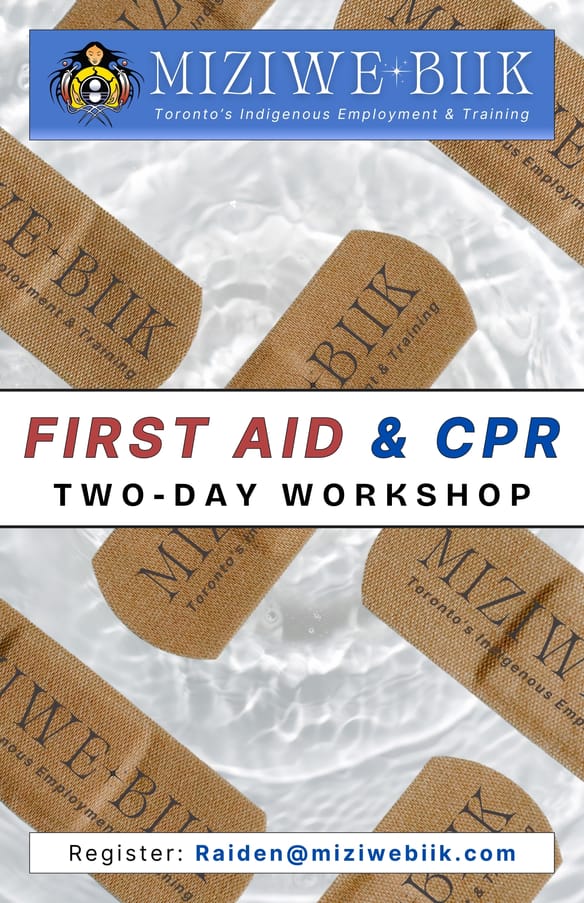
Two-day in-person workshop to get your First Aid and CPR certificate! Dates * July 2 & 3 * August 6 & 7 ✨ Register »
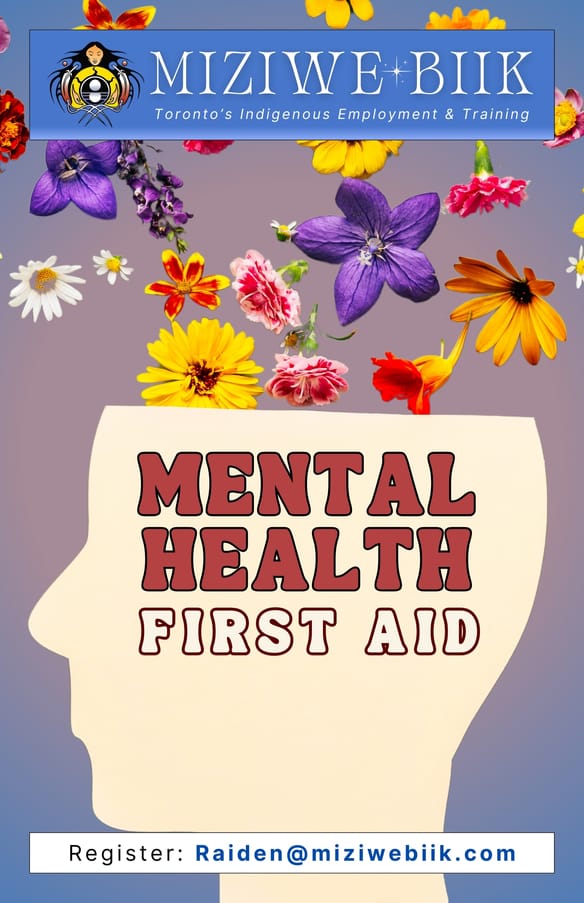
Two-day workshop for learning how to take care of your mental health! Dates * September 25 & 26 * November 10 & 11 ✨ Register »
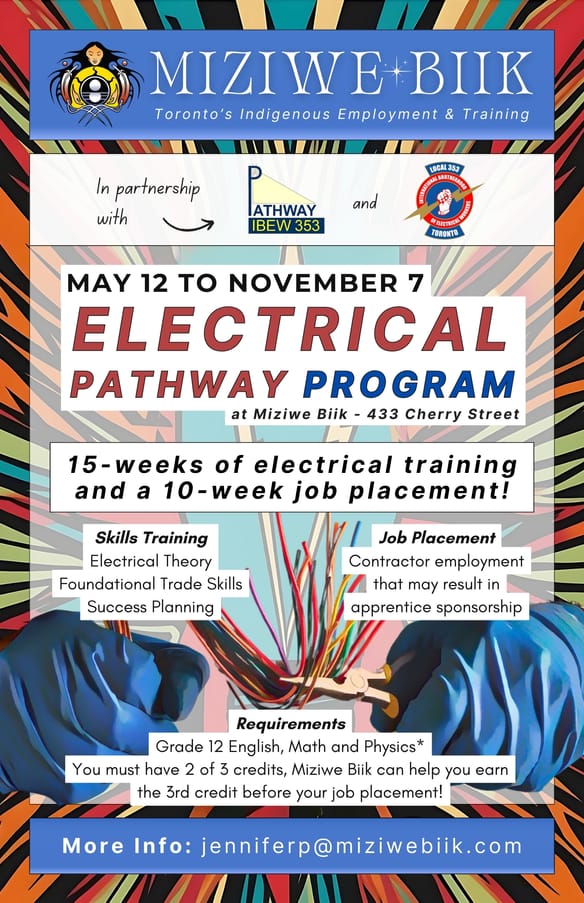
15-weeks of training and a 10-week job placement Training Includes * Electrical Theory * Foundational Trade Skills * Success Planning * Academic Upgrading Job Placement Contractor employment that may result in apprentice sponsorship. Requirements * Grade 12 * English * Math * Physics 💡You must have 2 of 3 credits, Miziwe Biik can help you earn the 3rd »
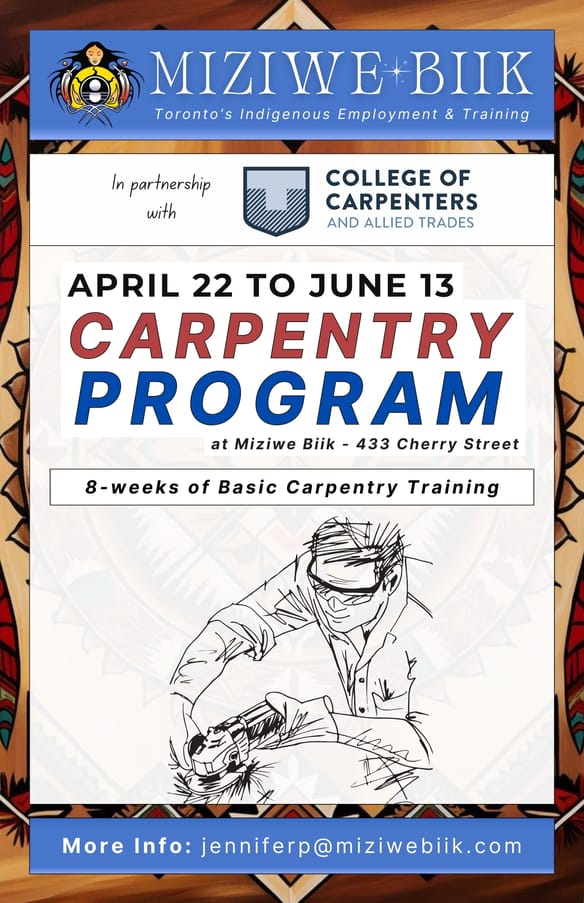
8-weeks of Basic Carpentry Training 🔨Indigenous and in the GTA? Our Carpentry Program offers a diverse choice of career paths! Training Includes * Basic Carpentry Skills * Safety, Materials, and Tools * Plans, Specifications, and Codes * Estimating, Calculations, and Layout * Metal Cutting and Welding Supplies A basic hand tool set and personal protective »
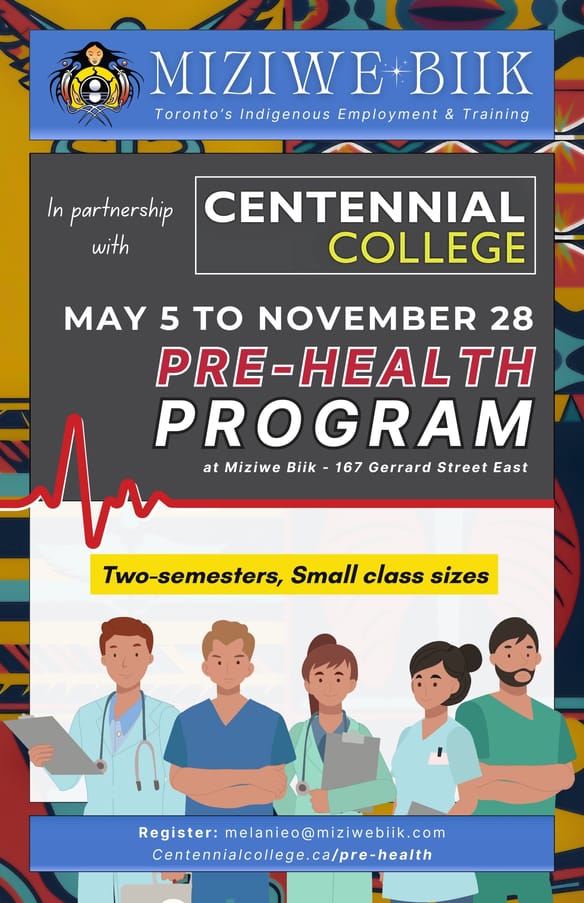
Two-semesters, Small class sizes 🚑Indigenous and in the GTA? Our Pre-Health Program is your pathway into Practical Nursing and other Health Related Fields! Training Includes * Biology * Chemistry * Math * Communications We will help you achieve the requirements * High School Diploma, or equivalent * Grade 12 English, or equivalent * Grade 11 Math, or »
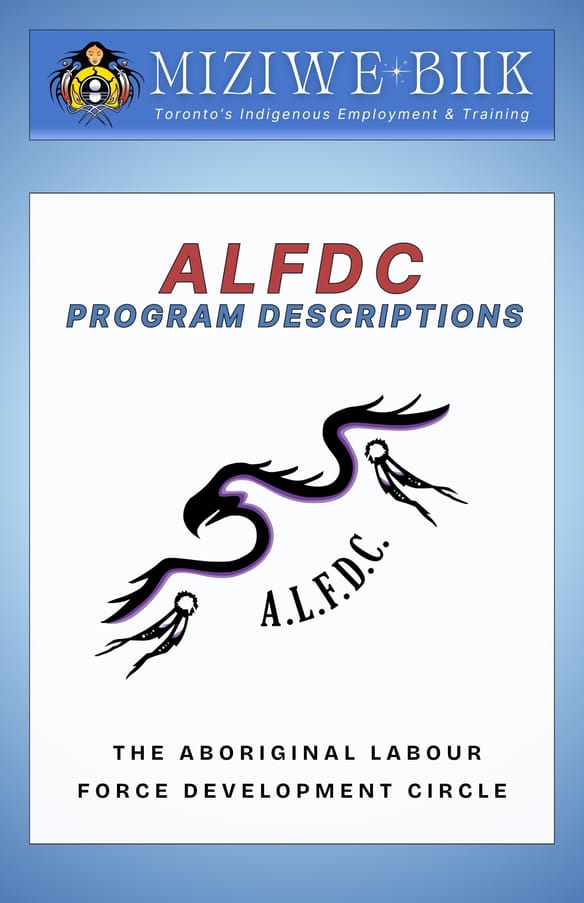
Miziwe Biik is a member of the Aboriginal Labour Force Development Circle (ALFDC) The ALFDC is the Aboriginal Human Resources Development Agreement holder between First Nations, Urban Boards and the Federal Government. The ALFDC administers funding, reports to Human Resources Development Canada, develops programs, policies and procedures for members, and »

1 - on - 1 support to earn your * High School Diploma * Trades and other program prerequisites * Canadian Adult Education Credential (Formerly GED) Training Includes * Math * Science * Social Studies * Reading and Writing ✨ Register »

Clients attending High School are eligible to receive annual funding for books and supplies! Requirements * Completed Client Registration Form, signed and dated Miziwe Biik - Client Registration FormMiziwe Biik - Client Registration Form.pdf274 KBdownload-circle * Completed Ancestry Form, signed and dated or a copy of your status card Miziwe Biik »
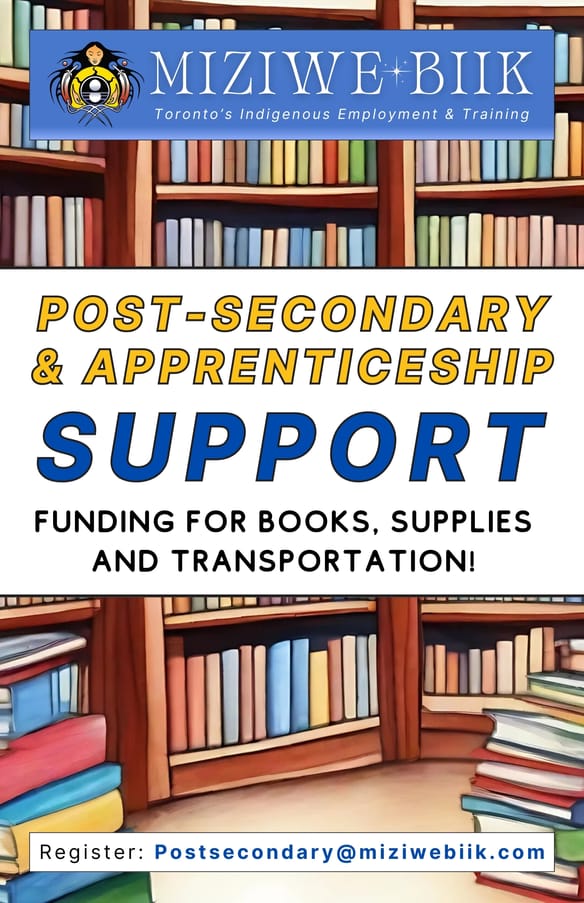
Funding for books, supplies, and Transportation! Requirements * Completed Client Registration Form, signed and dated Miziwe Biik - Client Registration FormMiziwe Biik - Client Registration Form.pdf274 KBdownload-circle * Completed Ancestry Form, signed and dated or a copy of your status card Miziwe Biik Ancestry Information FormMiziwe Biik Ancestry Information Form.docx15 »

Highlight your abilities and personality! Get 1-on-1 help crafting a professional resume and cover letter that highlights your unique skills, abilities, experiences, and personality! ✨ Register »

Financial assistance for clients who have recently obtained employment! Eligible Participants Recently employed clients providing a letter of employment. Duration One time access per employment and fiscal year. ✨ Register »

Indigenous and in the GTA? Become a Miziwe Biik Client at no cost! Our 1-on-1 Employment Advisors guide Indigenous individuals in the Greater Toronto Area towards rewarding careers! 💡Client Registrations expire every April 1st✨ Register »

Financial support for up to 12 weeks to Indigenous entrepreneurs starting a business! Downloads Grant Application Form - 2025/2026Miziwe-Biik-Grant-Application-Form-2025-2026.doc104 KBdownload-circle Send your completed Grant Application Form to: Proposals@miziwebiik.com »

8-week online entrepreneurship program to create a business and write a business plan! Dates * April 28 to June 20 »

Transition Towards Employment! Workshops Include * Professional Communication * Writing Foundations * Computer Training * Personality Dimensions * Successful Self-Management Dates Next Program TBD »
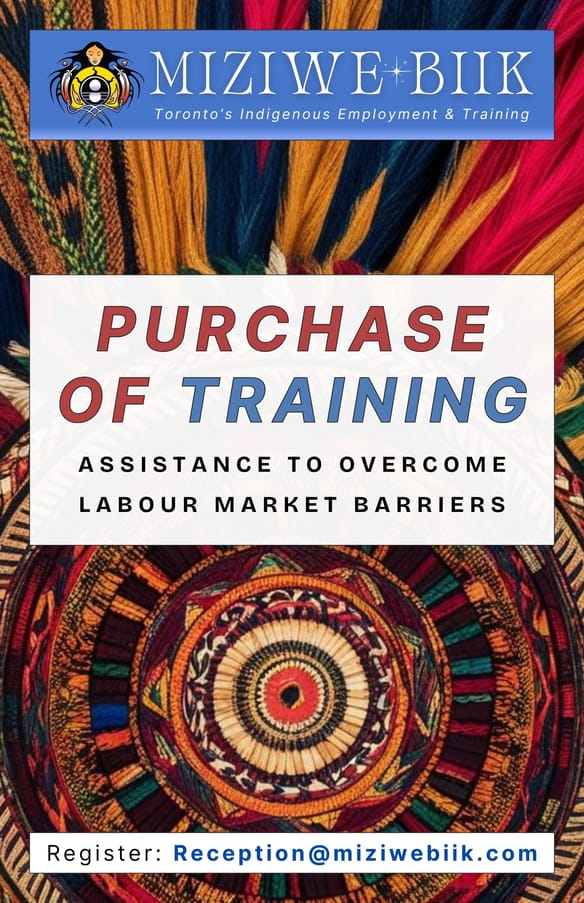
Assistance to overcome existing or anticipated labour market barriers! Eligible Sponsors * Businesses * Educational institutions * Qualified Trainers Eligible Clients Require assistance overcoming existing or anticipated labour market barriers. ✨ Register »
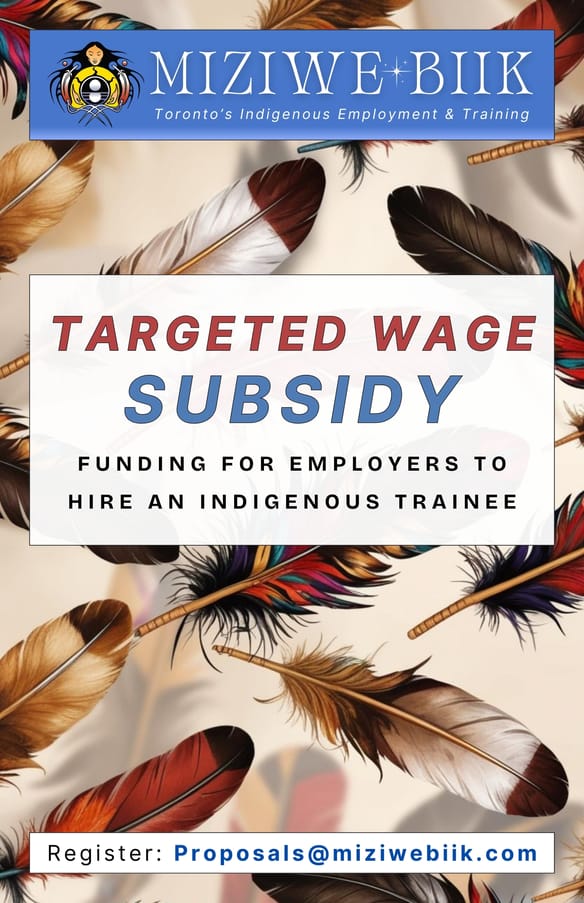
Funding for employers to hire an Indigenous Trainee and to provide them on-the-job training! Eligible Employers * Businesses * Organizations * Institutions * Governments Duration Up to 52 weeks Grant Application Form - 2025/2026Miziwe-Biik-Grant-Application-Form-2025-2026.doc104 KBdownload-circle Send your completed Grant Application Form to: Proposals@miziwebiik.com »

Funding to create summer student jobs! Eligible Employers * Businesses * Organizations * Institutions * Governments Eligible Participants * Full-time students ages 14-30* who are returning to school * *14-35 for alter-abled students Duration Training may last up to 20 weeks Grant Application Form - 2025/2026Miziwe-Biik-Grant-Application-Form-2025-2026.doc104 KBdownload-circle Send your completed Grant Application Form to: »
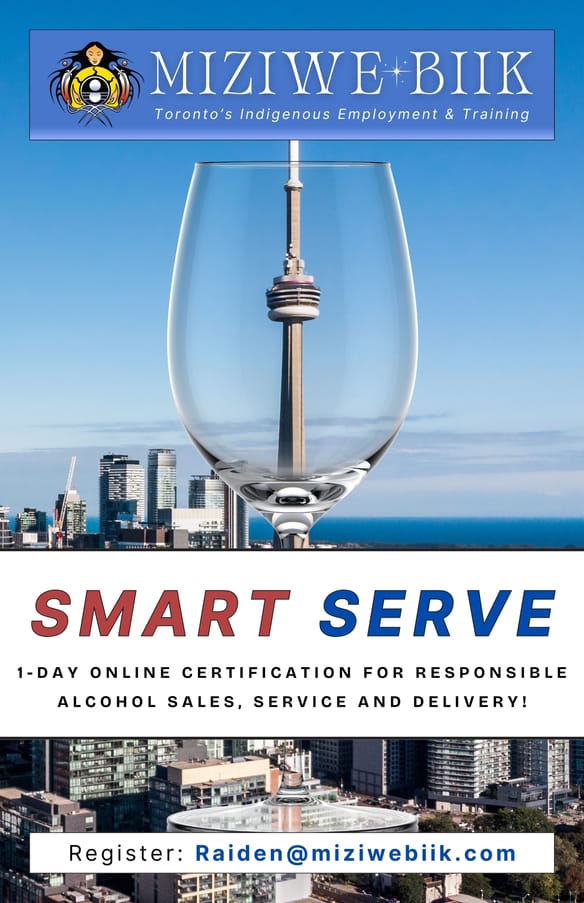
1-day online certification for responsible alcohol sales, service and delivery! ✨ Register More Information https://smartserve.ca/ »

Employers and Individuals can apply for Funding! Downloads Call for Proposals - Information-Package - 2025/2026Miziwe-Biik-Call-for-Proposals-Information-Package-2025-2026.pdf189 KBdownload-circleCall for Proposals - Slideshow - 2025/2026Miziwe-Biik-Call-for-Proposals-Slideshow-2025-2026.pdf3 MBdownload-circleGrant Application Form - 2025/2026Miziwe-Biik-Grant-Application-Form-2025-2026.doc104 KBdownload-circleALFDC - Program DescriptionsALFDC - Program Descriptions.pdf311 KBdownload-circle »

Provides up to $28,000 for in-demand job skills training! Better Jobs Ontario provides eligible applicants with: * Skills training for in-demand jobs * Financial support You can apply for up to $28,000 for costs, including: * Tuition * Books * Other instructional costs, including student fees, supplies and electronic devices * Transportation * Basic living »
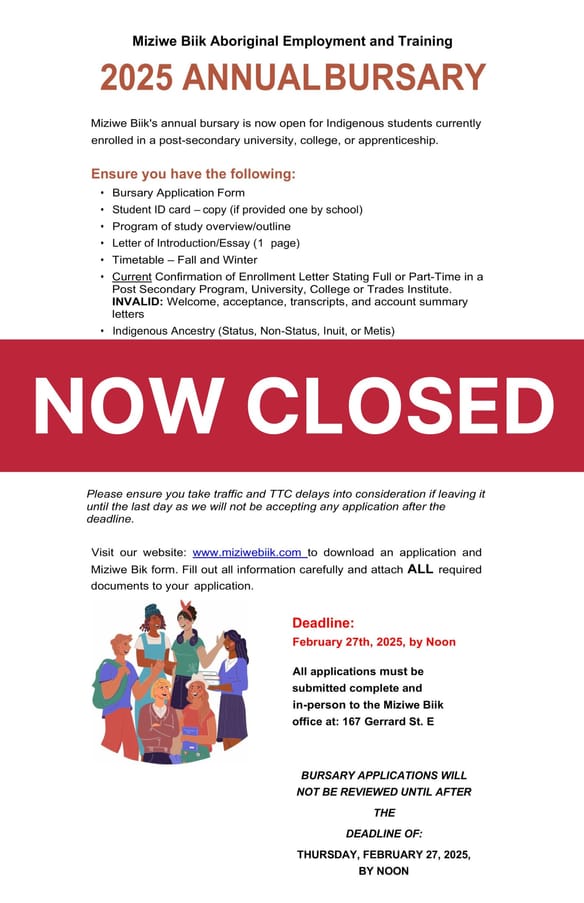
Miziwe Biik offers an annual bursary for Indigenous students enrolled in post-secondary, college or an apprenticeship! Check back in January 2026 for our next bursary!! »